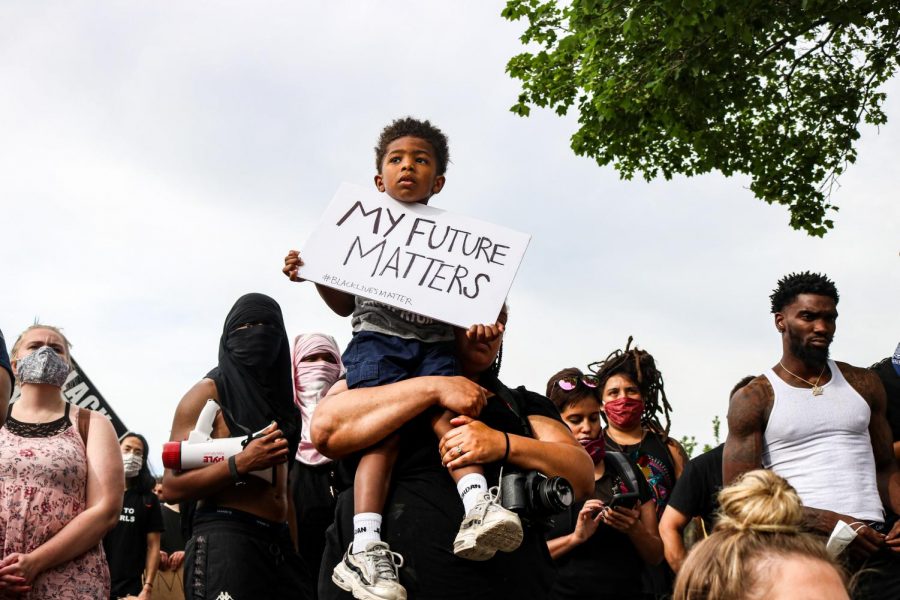Cushman: Utah’s Current Education Funding Mechanism Impedes Racial Justice
Julius Rowe Jr. and his mother Danielle Rowe at the Black Lives Matter Protest at the Utah Capitol in Salt Lake City on June 4, 2020. “He wanted to come and show his support and show that he is a little Black boy and he wants to have a future,” Danielle Rowe said. (Ivana Martinez I Daily Utah Chronicle)
July 5, 2020
Racial justice is on many Americans’ minds right now, with protests about police brutality against people of color taking the nation by storm. Since the death of George Floyd, the fight has focused largely on police reform, but racial injustice is an interconnected issue, from higher rates of pregnancy-related deaths among Black women to poverty to education funding mechanisms. Utah law and national historical precedent dictate that public schools must be funded primarily by property taxes, a rule that has left impoverished communities undereducated in comparison with affluent ones. There are several reasons that needs to change.
First, property tax-based education funding guarantees that rich communities receive more money for their schools than poor communities, simply because they pay more in property taxes. A 2016 NPR story paints a picture of the two starkly different kinds of American schools that result from that disparity, with some being understaffed, severely underfunded and forced to share nurses and specializing teachers while others have small class sizes, experienced teachers and plenty of resources.
Using property taxes to fund schools began as a way to hold communities accountable to their students, but in reality it allows students from poorer communities to slip through the cracks while wealthier students enjoy higher rates of success. It effectively guarantees that students in poor communities have less opportunity. This is a nation where all people are supposedly created equal; the American dream dictates that everyone should be able to achieve whatever they want if they are willing to work hard. But the way we fund schools makes it impossible to offer equal education to each student and closes the door of opportunity for students who live in impoverished neighborhoods.
In other words, current education funding mechanisms inhibit students’ long-term financial success and ability to break the cycle of intergenerational poverty. Education is a significant indicator of income and economic mobility. The skills a good education provides are necessary to be economically successful. More education also means more earning potential. According to the U.S. Bureau of Labor Statistics, people with doctoral or professional degrees earn triple the amount of those who have not completed high school.
It’s important to note, too, that students in poverty start out at a disadvantage – making it all the more problematic that their schools are so underfunded. Many of them enter kindergarten with a “readiness gap,” lacking the motor skills and memory retention that their more affluent peers have had the opportunity to develop. This gap often only grows over time. By funding schools with property taxes, state governments – including ours – ensure that students who are already facing barriers do not have access to the same resources, are in worse learning environments and will receive a lower quality education. It keeps impoverished communities in poverty.
This is one of many examples of institutional racism acting as a barrier to good education for Black, indigenous and people of color (BIPOC), who, by design, make up a large portion of these poor communities. Redlining and white flight are real racist phenomena that have stopped BIPOC from owning property and devalued the property they do own for decades. Redlining was a policy created by the American government following the Great Depression that enforced racial housing segregation and ensured that white neighborhoods had higher property values. That segregation has been further solidified by white flight, where white families move out as more diverse populations move into a neighborhood, taking their wealth and commerce with them. These racist policies and practices are not part of the American past, but rather a part of the American present that still hurts non-white families’ long-term wealth accumulation, health and access to education.
Governments fund schools through property taxes to ensure that communities have a vested interest in the education being provided in their schools and to guarantee that individual taxpayers fund education only as much as they can afford, since property value is a reliable indicator of economic prosperity. However, fairness in payment does not result in a fair or equal education. If Utah leaders truly care about offering all our children the best possible education, they should scrap this outdated, discriminatory mechanism for school funding.








